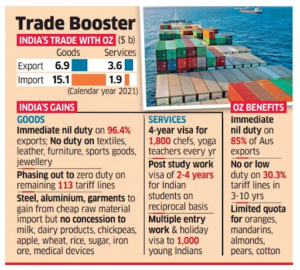In news- The India-Australia Economic Cooperation and Trade Agreement (IndAus ECTA) was signed recently.
About the Ind-Aus ECTA-
- The Agreement encompasses cooperation across the entire gamut of bilateral economic and commercial relations between the two friendly countries, and covers areas like Trade in Goods, Rules of Origin, Trade in Services, Technical Barriers to Trade (TBT), Sanitary and Phytosanitary (SPS) measures, Dispute Settlement, Movement of Natural Persons, Telecom, Customs Procedures, Pharmaceutical products, and Cooperation in other Areas.
- It is the first Free Trade Agreement (FTA) that India has signed with a major developed country in over a decade.
- In February, India signed an FTA with the UAE and is currently working on FTAs with Israel, Canada, UK and the EU.
- ECTA provides for an institutional mechanism to encourage and improve trade between the two countries.
- India will benefit from preferential market access provided by Australia on 100% of its tariff lines.
- On the other hand, India will be offering preferential access to Australia on over 70% of its tariff lines, including lines of export interest to Australia which are primarily raw materials and intermediaries such as coal, mineral ores and wines etc.
- It seeks to almost double bilateral trade in the next five years to $45-50 billion from $27 billion now.
- The agreement will also give about 85 percent of Australia’s exports zero-duty access to the Indian market, including coal, sheep meat and wool, and lower duty access on Australian wines, almonds, lentils, and certain fruits.
- Zero-duty access for Indian goods is set to be expanded to 100 percent over five years under the agreement.
- Under the agreement, Indian graduates from STEM (Science, Technology, Engineering and Mathematics) will be granted extended post-study work visas.
- Australia will also set up a programme to grant visas to young Indians looking to pursue working holidays in Australia.

- Australia is set to benefit from zero-duty access to coal which currently accounts for about 74 per cent of Australia’s exports to India and currently attracts a duty of 2.5 per cent.
- The agreement will also allow for faster approval of Indian medicines by Australian regulators as they have agreed to use inspection reports and approvals from Canada and the EU in the evaluation process for India pharmaceuticals and manufacturing facilities.
Source: Economic Times














